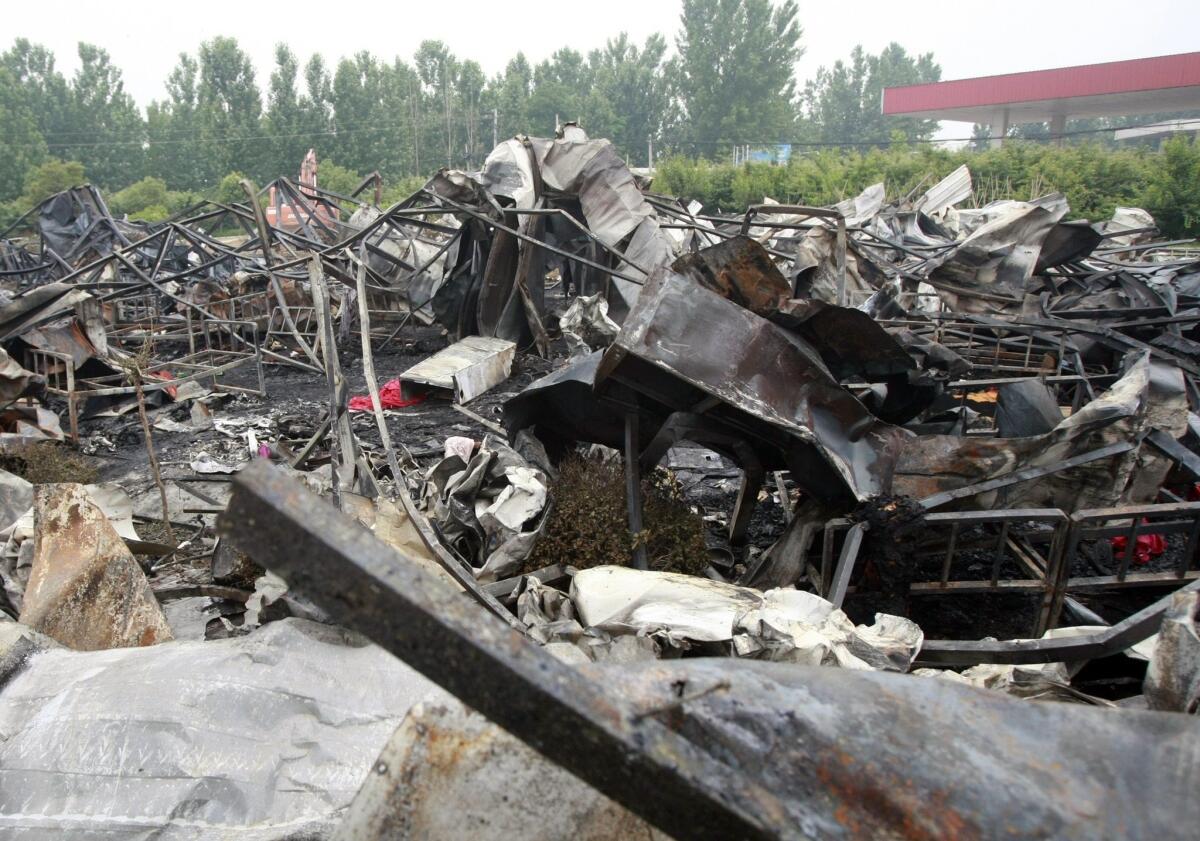Nursing home fire kills at least 38 seniors in Henan, China

Charred building frames and bedsteads are seen May 26 after a fire broke out in a nursing home in central China’s Henan province. The fire left at least 38 people dead, officials said.
- Share via
Reporting from Beijing — A fire broke out at a nursing home in a central China county late Monday, killing at least 38 frail seniors who couldn’t evacuate without assistance.
The suspected electrical fire spread quickly across a foam-walled section where a dozen rooms housed 51 beds for incapacitated residents. News photos from state media showed the highly flammable structure was burned to the ground, leaving a nest of mangled steel frames and charred wheelchairs.
Six residents managed to reach safety on their own but suffered varying degrees of injuries.
One of the survivors, Guo Xin, 78, told a reporter from New China News Agency that he was in bed when he heard someone scream, “Put out that fire!”
He saw a nursing aide climb out the window of a burning bedroom and cry out to him: “Get out, quick!” Guo said he ran outside to nearby wheat fields with thick fumes billowing behind him.
The nursing home in rural Henan province housed about 130 people, and was one of the best known in the area. As word of the fire circulated, children of the residents rushed to the scene to take them home.
The deaths set off impassioned discussion on the Internet about the declining tradition, in China’s rapidly aging society, of families caring for the elderly at home.
“So are nursing homes becoming old people’s graveyards?” read one comment posted on the microblog site Weibo. “Or crematoriums?”
Nearly 15% of the country’s population — more than 200 million people — are 60 or older, according to the China Research Center on Aging. The number age 80 or above has been growing by about 1 million every year, reaching 23 million in 2013, the most recent year for which figures are available.
Responsibility for the swelling population of seniors has fallen on a shrinking group of workers, the result of the government’s one-child policy imposed a generation ago. Many have had to migrate from rural areas to cities to find employment.
Nearly half of the country’s seniors live apart from their children, a phenomenon unheard of a generation ago.
The government and other organizations have been pressing people to take an active role in their parents’ lives. A national statute that took effect in 2013 mandates that family members attend to the spiritual needs of the elderly and visit them “often” if they live apart.
“With all the talk in recent years about encouraging society as a whole to care for the old, why is that only after a tragedy does the blame game begin? In about a decade, the parents of all the single children will be getting old, then who is to blame?” read another comment posted on Weibo.
As the 2,500-year-old Confucian ideal of filial piety becomes increasingly difficult to sustain, more and more privately run homes for the aged have emerged to fill the void.
The one where the fire broke out Tuesday was operated by Fan Huazhi, a 50-year-old former farmer and restaurateur from the area, according to state news reports.
Fan opened the home in late 2010, with official approval, to care for the growing number of elderly in her community. She staffed it mostly with her friends and family.
Local officials told journalists that the construction of the section that caught fire didn’t meet government standards, which forbid the use of flammable, fragile or toxic building materials. Even so, the home passed inspection in 2011, and Fan was named one of the county’s model citizens in 2013.
She was reportedly taken in for questioning along with most of her staff.
Guo, one of the few elderly residents who escaped unscathed, said the section housed many people who could not walk on their own or feed themselves.
“Everyone can see that section is a metal shack with no brick walls or foundation,” Guo was quoted as saying.
Another resident, Chen Runde, told a reporter that the staff were stretched thin. “You can’t get any help all day long,” Chen said.
All the other sections of the home remained standing after the fire. A painted banner above the entrance still reads: “We are here to fulfill the filial duty for all sons and daughters.”
Law is a special correspondent. Tommy Yang in the Times’ Beijing bureau contributed to this report.
More to Read
Sign up for Essential California
The most important California stories and recommendations in your inbox every morning.
You may occasionally receive promotional content from the Los Angeles Times.













